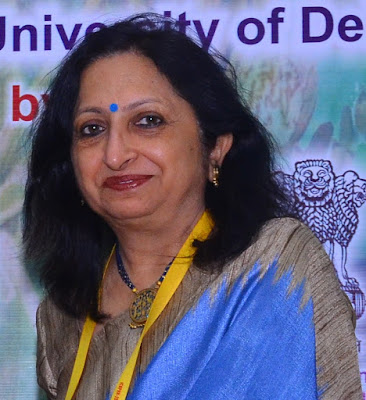I have come across students who have done schooling in Hindi medium so in such cases, I have to spend a little extra time and get them through with the issues they are struggling with. What I mean to say is that a little extra effort can transform the life of a student. We feel rewarded when such students get success in life. I believe that student's success is my success.
I try to make each and every student in my class feel at ease so that they can ask questions without any hesitation. In our education system, students’ knowledge is tested only by marks.
Tell us more about your experience as an educator.
I learn something new and grow every day that I serve as an educator. In colleges of Delhi University, we get a heterogeneous group at the undergraduate level, so we have to work with students who have diverse interests and diverse backgrounds.
I have come across students who have done schooling in Hindi medium so in such cases, I have to spend a little extra time and get them through with the issues they are struggling with. What I mean to say is that a little extra effort can transform the life of a student. We feel rewarded when such students get success in life. I believe that student's success is my success.
I try to make each and every student in my class feel at ease so that they can ask questions without any hesitation. In our education system, students’ knowledge is tested only by marks. But sometimes, somehow, students are not able to perform well on a particular exam day and get fewer marks which further affects their personality or performance.
I learn something new and grow every day that I serve as an educator. In colleges of Delhi University, we get a heterogeneous group at the undergraduate level, so we have to work with students who have diverse interests and diverse backgrounds.
I have come across students who have done schooling in Hindi medium so in such cases, I have to spend a little extra time and get them through with the issues they are struggling with. What I mean to say is that a little extra effort can transform the life of a student. We feel rewarded when such students get success in life. I believe that student's success is my success.
I try to make each and every student in my class feel at ease so that they can ask questions without any hesitation. In our education system, students’ knowledge is tested only by marks. But sometimes, somehow, students are not able to perform well on a particular exam day and get fewer marks which further affects their personality or performance.
I usually identify such students and try to lift their confidence. One such student became a university topper then she got admission in masters in the most sought-after course of Delhi University. At present, she is doing a Post-doc from Harvard Medical College.
What changes in the teaching methodologies have you seen in recent times?
The revolutionary change in teaching in my classes has come from online teaching and technology during this current situation arising due to the covid-19 pandemic.
Those days have gone when the classrooms were drab and dull. We have progressed from blackboards to overhead projectors, and now a 3D depiction of concepts is possible via ppt or animation, etc.
The revolutionary change in teaching in my classes has come from online teaching and technology during this current situation arising due to the covid-19 pandemic.
Those days have gone when the classrooms were drab and dull. We have progressed from blackboards to overhead projectors, and now a 3D depiction of concepts is possible via ppt or animation, etc.
To learn and understand Science, we give a Hands-on experience of almost all the experiments related to the subject. We also encourage two-way interaction that leads students to ask questions, it also helps them to explore new concepts.
How did you develop your research interest and why is it important?
My inquisitive mind has always dragged me towards research. Having an inquisitive mind and curiosity towards things is essential to be a good researcher as it helps you ask questions that other people have not asked earlier.
My inquisitive mind has always dragged me towards research. Having an inquisitive mind and curiosity towards things is essential to be a good researcher as it helps you ask questions that other people have not asked earlier.
This in turn forces an individual to think out-of-the-box solutions to those problems which I feel is the essence of research. Moreover, during my undergraduate days, I saw Prof K K Dua at Dayalbagh Educational Institute, Agra working day and night in the lab. He is superannuated now.
I have never met a teacher like him in my life. He taught us embryology which is to date my favorite subject. He was a good researcher too. He is a big source of inspiration for me.
What is your opinion of the New Indian education policy changes?
The part I liked the most about the New Indian Education Policy is that a child can start his/her education in his/her mother tongue. If children are allowed to study in their own language, then their family could be a part of their learning – for instance, the family can help the student in reading and learning.
The part I liked the most about the New Indian Education Policy is that a child can start his/her education in his/her mother tongue. If children are allowed to study in their own language, then their family could be a part of their learning – for instance, the family can help the student in reading and learning.
They would not depend solely on school. At present, the child remains busy mugging up the course content without understanding the concepts. NEP could change that.
Another aspect of the policy that will highly benefit the students is the amount of flexibility that it offers students while pursuing graduation. The policy now offers many entry and exit points and introduces a facility to store credits. Moreover, students can now pursue more interdisciplinary work as they have the flexibility to mix and match courses.
Another aspect of the policy that will highly benefit the students is the amount of flexibility that it offers students while pursuing graduation. The policy now offers many entry and exit points and introduces a facility to store credits. Moreover, students can now pursue more interdisciplinary work as they have the flexibility to mix and match courses.
What are some of your top researches?
During my Ph. D. I was successful in exploring twenty-three new species, two new genera, one new subfamily, and one new family of monogenetic trematode parasites of fishes. Later, during my postdoctoral research, I shifted my work to entomopathogenic nematodes which serve as biocontrol agents against many insect pests of various economically important crops.
During my Ph. D. I was successful in exploring twenty-three new species, two new genera, one new subfamily, and one new family of monogenetic trematode parasites of fishes. Later, during my postdoctoral research, I shifted my work to entomopathogenic nematodes which serve as biocontrol agents against many insect pests of various economically important crops.
I assessed the compatibility of such nematodes, Steinernema glaseri, Heterorhabditis bacteriophora, and Heterorhabditis indicus with various concentrations of Malathion (an organophosphate) which is used to kill insects.
In another study, I observed the bio-compatibility of these above-said nematodes with nematode-trapping fungus, and both the studies were published in prestigious international journals.
What advice would you pass on to someone who wants to be a Professor?
My first and foremost advice to youngsters who want to become educators would be to have a thorough knowledge of their subject, and a passion for disseminating information effectively among future generations.
One also needs to be patient to listen to the queries raised by the students and intelligently answer their questions.
What skills make a successful researcher?
Three ‘P’ patience, perseverance, and passion towards the subject can make anyone a good and successful researcher.
For further clarifications, reach on E-mail
Interviewed by - Ritika Malhotra
Three ‘P’ patience, perseverance, and passion towards the subject can make anyone a good and successful researcher.
For further clarifications, reach on E-mail
Interviewed by - Ritika Malhotra









0 Comments